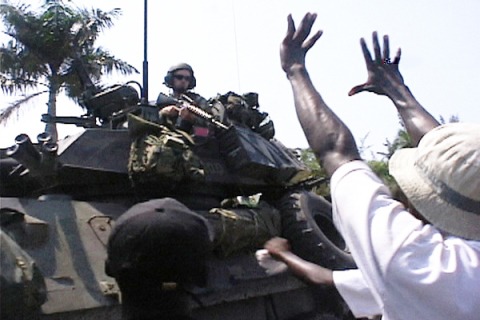Haiti forum denounces U.S. occupation
Berkeley, California
Haiti was the focus of the Feb. 4 revival of the Peace and Freedom Party’s monthly political meetings, held here at the Starry Plough Irish Pub revolutionary pub.

Pro-Aristide demonstrator in Haiti in early March 2004, protesting the Feb. 29 coup and facing the assault rifle of a U.S. soldier. (Photo: Haiti Information Project)
Pierre Labossiere, co-founder of the Haiti Action Committee, was first to speak at the meeting, saying, “The so-called ‘gangs’ sowing terror in Haiti today are really paramilitary death squads, allied with the Haitian National Police. Haitians and international observers see that these paramilitary groups are thriving under the present U.S./U.N. occupation of Haiti. That’s why the sentiment in Haiti is to oppose any expansion of the foreign occupation. We want all foreign boots on the ground to be gone.”
Labossiere said today’s “gangs” are modern-day incarnations of the Tonton Macoutes, a paramilitary secret police employed during the dictatorship of François Duvalier and his son, Jean-Claude Duvalier, from 1957 to 1986. And, just as during the Duvalier era, today’s “gangs” act to prevent the restoration of Haiti’s traditional civil society, as well as to try to prevent the return of a strong labor movement.
“To understand Haiti, you have to go back to slavery times, when this was one of France’s richest colonies,” said Labossiere. “You had a small group of white plantation owners extracting big profits off the backs of the African workers, who were toiling on plantations from ‘can’t see in the morning’ to ‘can’t see at night.’
“You can look back and see the deep roots of the people’s movement in Haiti from the liberation war of 1791 to 1803, to the defiant victory of the Haitian Revolution in 1804, when with one fell swoop, Haiti overthrew slavery and declared independence from French colonial rule,” he continued.
“You can look at independent Haiti’s support for Simón Bolívar in his quest to free South America from Spanish rule, providing weapons, supplies and Haitian soldiers, while supporting the abolishment of slavery in the U.S., the Caribbean and the Americas.”
In his remarks, Robert Roth, one of the co-founders of the Haiti Action Committee, pointed out that today’s disastrous situation for the Haitian people stems directly from the Feb. 29, 2004, coup d’état and the subsequent invasion by U.S., French and Canadian armies, where the democratically elected government of Haiti was overthrown.
At that time, President Jean-Bertrand Aristide and his spouse, Mildred Trouillot Aristide, were kidnapped and flown across the Atlantic to Africa on a U.S. military plane. A series of illegitimate governments were then imposed on Haiti over the next 19 years by the U.S./United Nations occupation.
“For Haitians this has meant a breakdown of public order and safety, food insecurity for millions, abuses by U.N. troops, two cholera epidemics and the destruction of the economy and civil society,” said Roth. “The whole U.S. project is in danger of collapsing.”
The people are in the streets for days at a time, which is why the foreign players are pushing for more foreign troops and military control, Roth concluded.
The third speaker of the afternoon was Gerald Smith from the Labor Action Committee to Free Mumia Abu-Jamal. He discussed the many West Coast actions for Mumia, including in April 1999, when the International Longshore and Warehouse Union shut down all Pacific coast ports for one day, and the April 24, 1999 “Millions for Mumia” march, where 25,000 people marched in San Francisco and Philadelphia for Mumia.

